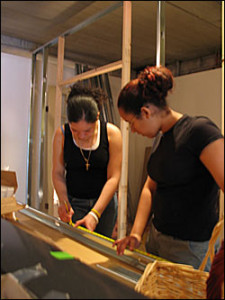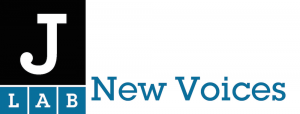By Jan Schaffer, J-Lab Executive Director
The sound of hammers hitting nails at the Lower Eastside Girls Club marks the construction of a tiny sound studio for a new kind of radio program: podcasting.
The New York City girls club will use the studio to create news reports that can be downloaded from a computer and listened to on hand-held players.
Tekserve Corp., a local computer company, has donated 20 iPod Shuffles so that the girls, ages 15-21, can listen to studio podcasts even after their classes ends.
They have plenty of stories to report in this rapidly changing Manhattan neighborhood, where young professionals are moving in and ethnic residents and artists are moving out.
 The girls club is learning about podcasting through a program called New Voices, funded with a $1 million Knight Foundation grant to the University of Maryland’s J-Lab, an incubator for innovative news experiments. New Voices invited proposals from nonprofit groups around the country that wanted to start up micro-local news projects. They responded with 243 ideas for everything from podcasts to Web sites, newspaper to blogs to engage people in community issues.
The girls club is learning about podcasting through a program called New Voices, funded with a $1 million Knight Foundation grant to the University of Maryland’s J-Lab, an incubator for innovative news experiments. New Voices invited proposals from nonprofit groups around the country that wanted to start up micro-local news projects. They responded with 243 ideas for everything from podcasts to Web sites, newspaper to blogs to engage people in community issues.
“Computers are changing news,” said Eric Newton, Knight Foundation director of journalism initiatives. “Since we don’t know what the future will bring, we are trying to be sure our programs reach into the streets of the nation’s communities as well as into the high-rises of the nation’s media capitals.”
In all, New Voices will help fund the start-up of 20 citizen news projects with $12,000 grants, support them with an educational Web site and help them continue with $5,000 second-year matching grants.
In Deerfield, N.H., the New Voices project attracted law professors and students from Franklin Pierce Law Center, who donated services, pro bono, that helped volunteers of the Philbrick James Forum gain 50l(c)3 status to launch a community newspaper and Web site.
“This is all about a town that’s desperate for a newspaper,” said the group’s interim chair, Maureen Mann. Making the venture even more important, she said, is that local voters recently eliminated the New England town-meeting tradition that had long informed and engaged Deerfield residents.
As in Manhattan and Deerfield, volunteers are moving quickly in the other New Voices communities to start their local news ventures. Citizens are building Web sites, contacting potential partners and holding community meetings to get input on content and to solicit contributors.
Virginia’s “Loudoun Forward” project, an emerging public think-tank, plans to publish across several mediums (newspaper, Web, Weblog, e-newsletter) and will report on local issues such as housing, crime and economic development in Loudoun, one of the nation’s fastest-growing counties. The project recruited 15 community leaders to attend a June 28 advisory session, including the CEO of the area’s largest bank, heads of major technology, arts and civic groups, and former political leaders of both parties. “Everyone has been outspoken in support,” said Tamar Datan, one of the project’s leaders. “I think we’re really hitting a nerve.”
For most of the projects, wooing citizen journalists is critical.
Radio Free Moscow, a new low-power FM radio station in Moscow, Idaho, held a community meeting in mid-June to get ideas for the kinds of stories it should cover. “The people who have ideas also have ideas about who can write about them,” said board member Nancy Casey. Community news beats have been identified, including the University of Idaho, the city council, the environment, water and cultural happenings.
The KRFP station also is working with the university’s communications department to start a radio journalism program this fall with students providing on-air reports for the project.
The Twin Cities Community Newswire project is planning face-to-face meetings with editors of local neighborhood, minority and ethnic newspapers to solicit contributors, said project leader Jeremy Iggers. Iggers recently attended the OhmyNews International Citizen Reporters Forum in South Korea to build more expertise. (OhmyNews is a newspaper that uses stories from thousands of citizen-journalists.) In Chicago’s North Lawndale, neighbors are upset at the city’s planned closing of several schools. “This is particularly hitting African-American communities,” said project leader Isaac Lewis, who’s also editor of the North Lawndale News. He plans to have the nonprofit news organization’s proposed blog provide a forum for more information and discussion.
As the New Voices projects venture into new territories, they are being resourceful in meeting their challenges.
Philbrick James Forum volunteers in New Hampshire are establishing guidelines for print and Web submissions, as well as ethical guidelines, a conflict of interest policy and volunteer guidelines. They also are working to complete guidelines for privacy protection. Concerned about liability insurance, the group discovered it could join a state association of nonprofits to get the kind of “errors and omissions” insurance that community access television stations have.
Volunteers have already shot photos of Deerfield’s last town meeting, building content for a Year in Review edition.
And they are conducting a contest to name the paper and accompanying Web site. “In our heads . . . Philbrick James is really not a good name for a newspaper,” said Mann, “particularly if we want to do surrounding towns.”
The winning prize? A gift certificate to a local pizza parlor.



